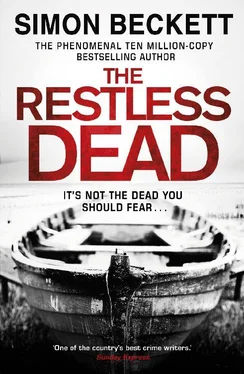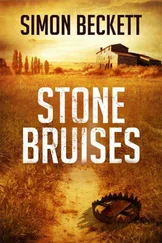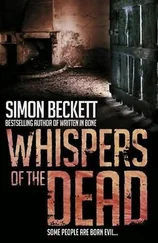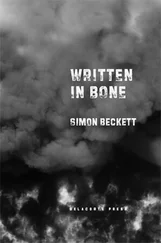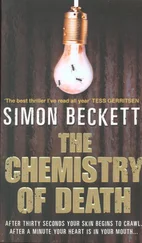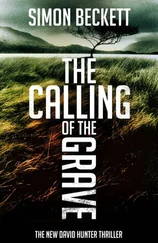But there were still things I didn’t understand, frayed threads of questions that tiredness and caffeine only seemed to tangle more. ‘How would Porter have known about Edgar’s house in the first place?’ I asked, pushing back the chair as I stiffly stood up. ‘Has Leo... I mean Lena Merchant said anything about that? There must have been some reason why the Villiers estate let him live rent free.’
‘Sorry, I can’t discuss that.’
The sudden curtness surprised me. Clarke hadn’t seemed to mind talking about other aspects of the case. But I wasn’t the only one who hadn’t slept, and the DCI still had this unholy mess to sort out. Perhaps she felt she’d already shown me enough courtesy for one night.
Or day, as it turned out. I’d lost track of time in the windowless room, but when I left the police headquarters a thin grey dawn was breaking. It was far too early to call Rachel, and my waterlogged phone wasn’t working anyway. Clarke told me they’d need to hold on to my bags and belongings from my car for the time being, so I took a taxi straight to the station.
I dozed fitfully on the train, and caught another cab to my flat rather than contend with the morning rush hour on the Tube. It seemed strange to be back in the bustle and grime of London after the reedy isolation of the Backwaters. There was an unnerving sense of disorientation as I walked up the familiar garden path to unlock the front door. The sticky smell of fresh paint threw me until I remembered the attempted break-in before I’d left. It seemed a long time ago.
There was a bill from the decorator on the floor among the junk mail, courtesy of my upstairs neighbour. I dropped it on the kitchen table, feeling restless and out of sorts. My head hummed from fatigue, but I’d reached that fretful stage of tiredness I knew wouldn’t let me sleep. Putting on the TV more for distraction than any desire to see the morning news, I filled the kettle to make coffee.
When I turned round again the sea fort was on the screen.
Seeing it here, in my flat, felt utterly surreal. For a moment or two I thought I was hallucinating as an overhead shot from a helicopter showed tiny white-clad figures moving about underneath the tower. But of course the murder of a DI would be big news, more so than ever after the shooting of his killer.
I switched off the TV. There seemed no air in the room. An image of Lundy bleeding out on the metal steps came to me, so vivid I could almost smell the blood and gunpowder. I tried to busy myself making coffee, but a nagging disquiet persisted. I was familiar enough with the way my subconscious worked to know that the TV news had shaken something loose. It wasn’t just the shock of seeing the sea fort, or the reminder of Lundy’s death. I was overlooking something. I just didn’t know what it was. Come on, what is it? What have you missed?
I poured myself a coffee, picturing the fort again. I visualized the ladder climbing to the gantry and how the sea had boomed and echoed underneath the tower. Waves breaking against its hollow legs, the wet drape of seaweed as gulls fed on the exposed sandbank...
That’s when I realized. I put my coffee down, cursing my stupidity. Like so many things, it had been staring me in the face.
Crabs.
The marine unit had to wait until the next low tide before they went out to the sea fort. Clarke hadn’t wanted me to go along. Her initial scepticism had faded as I’d made my case, but her reluctance had been harder to break down.
‘You need to get some rest. You’re no use to anyone half asleep, and you’ve been up all night,’ she argued.
So had she, but I knew better than to mention that. So I countered that I felt fine, that I could snatch a couple of hours’ sleep while we waited for the tide. She knew as well as I did that, if we found what I was expecting, they’d need a forensic anthropologist. And even if they could find someone at such short notice, a newcomer wouldn’t know the case half as well as I did.
Finally, Clarke agreed. After we’d finalized arrangements, I set my alarm and then collapsed on to the bed for two whole hours. I woke feeling grainy and far from rested, but a hot shower and breakfast helped. By the time I caught the train back to police headquarters for Clarke’s briefing I felt almost human again.
But going back out to the sea fort was more unsettling than I’d thought. The marine unit launch slogged through the post-storm waves, forced to anchor a little way off from the mooring platform. The police tape tied around the ladder and upper gantry made a low thrumming in the wind as we were ferried across by dinghy. I looked up at the rusted tower high above me, but my business wasn’t up there today.
It was lower down.
The sandbank around the tower was still underwater when we arrived, but by the time the forensic teams and equipment had been disembarked, a smooth brown curve had broken through the surface. It quickly grew, and as the CSIs stepped out on to the soft sand the first of the small crabs appeared.
I should have pieced it together sooner, although when I’d watched the tiny creatures the day before I’d still been in shock from Lundy’s shooting. But the information had still registered in my subconscious, gradually working its way out like a splinter until it could be plucked free. Crabs were scavengers. They fed on dead flesh, even when it was badly decomposed. And for so many of them to have colonized the sandbank meant there must be a plentiful food source buried inside it.
Like a body.
‘Are you sure about this, Hunter?’
Frears stood next to me on the platform, watching the pale crabs scuttle away from the CSIs’ spades as their refuge was destroyed.
‘Sure enough,’ I told him.
Ordinarily I might have had some anxiety that I was wrong, that I’d brought all these people out here on a fool’s errand. Instead I felt a quiet certainty. The crabs had been a catalyst, bringing together all the separate pieces that were already there. You’re half right , Porter had mocked when I’d asked if he’d hidden Emma Derby’s body in the Backwaters after dropping her from the tower. I hadn’t known then what he meant, but when he’d gone out to the sea fort to confront the blackmailers it had been in Leo Villiers’ boat. I’d seen it at Willets Point, a small dinghy moored to the wooden dock at the rear of the house.
Too small to carry Porter and two bodies.
He wouldn’t have realized his mistake until after he’d let them fall onto the mooring platform, sixty feet below. Once he’d done that he was committed. It wouldn’t have been practical to carry their dead weight back up a near-vertical ladder, so when he found there wasn’t room in the boat for both, his options had been limited. If he let the tide carry one of his victims away, he knew they’d eventually be washed ashore and discovered. But the low tide would have revealed another alternative.
He could bury one of the bodies in the sandbank.
Porter would have chosen Emma Derby for practical reasons. He would have been exposed out in the open under the fort, in a hurry to get away, and she was the smallest. She wouldn’t need as big a grave. I doubt he’d have had a shovel with him, but the wet sand would have been soft enough to dig with an oar blade. He wouldn’t have had to go down very far. Only deep enough for the tide not to uncover what was buried there.
Seawater seeped into the hole as the CSIs scraped the sand from what was left of Emma Derby. The crabs had been busy during the months she’d lain under the sea fort’s tower. Most of the exposed skin and soft tissue had been picked away, leaving behind bones and cartilage crusted with dirty-white adipocere. The sand-caked hair had sloughed off but it was still long and dark, plastered about the empty eye sockets and bones of the face. Although there was no resemblance to the beautiful and confident woman whose photograph I’d seen in the boathouse, I wasn’t in any doubt.
Читать дальше
